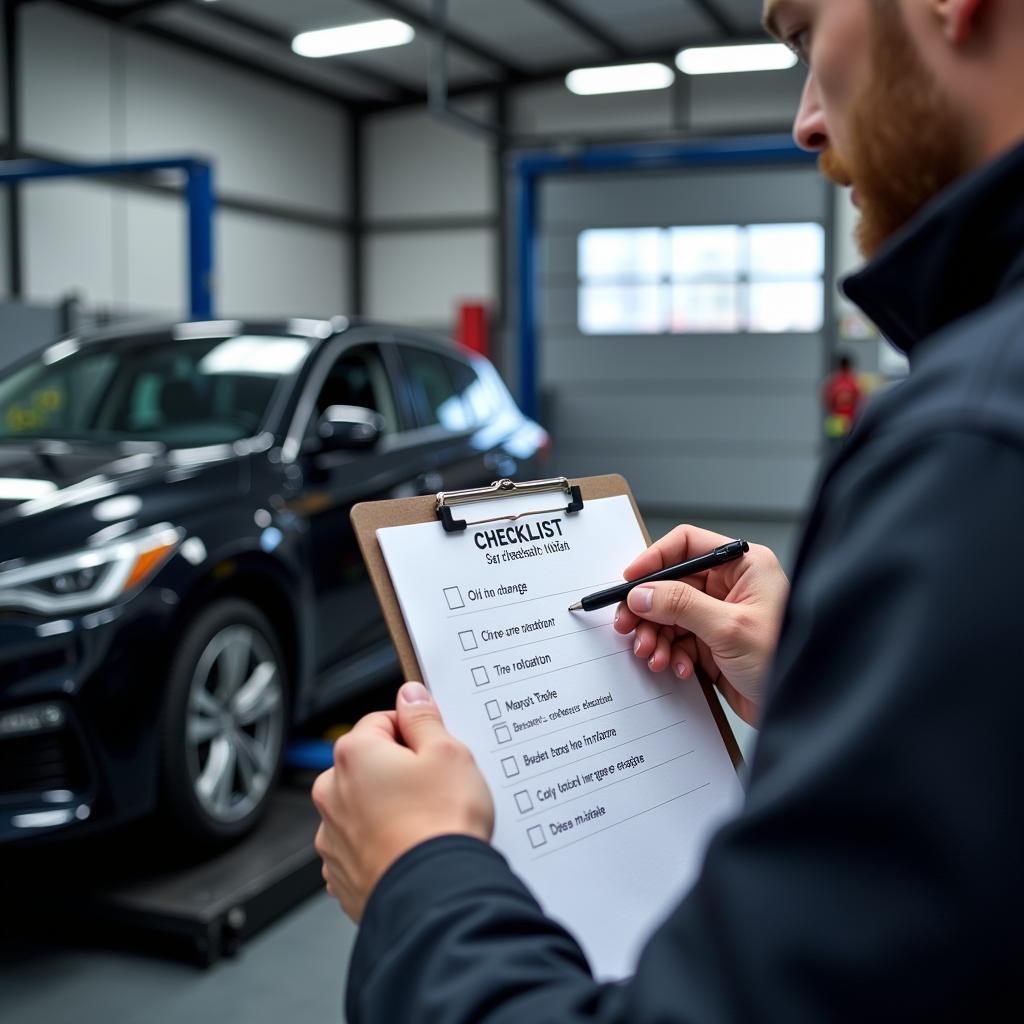Do You Have to Service Your Car Every Year?
Owning a car comes with responsibilities, and regular servicing is arguably one of the most important. But is an annual car service really necessary? The answer isn’t always straightforward. While the age-old advice of “once a year or every [mileage]” holds some truth, several factors can influence the ideal service frequency for your vehicle.
Understanding Your Car’s Needs
Modern vehicles are equipped with sophisticated technology and robust engineering, often surpassing the “one-size-fits-all” annual service recommendation. To determine the optimal service schedule for your car, consider the following:
1. Manufacturer’s Recommendations:
Your car’s owner’s manual is your best guide. It outlines specific service intervals based on your car’s make, model, and driving conditions. These recommendations are tailored to your vehicle’s engine, transmission, and other critical components, ensuring optimal performance and longevity.
 Car Owner's Manual
Car Owner's Manual
2. Driving Habits and Conditions:
Do you frequently navigate city traffic, tow heavy loads, or drive on rough terrain? These driving conditions can put additional strain on your vehicle, necessitating more frequent servicing. Conversely, if you primarily drive on highways with minimal stress, you might extend the service intervals.
3. Vehicle Age and Mileage:
As cars age, their components naturally wear and tear. Older vehicles or those with high mileage may require more frequent servicing to address potential issues before they escalate.
4. Warning Signs and Dashboard Indicators:
Your car often communicates its needs through warning lights on the dashboard. Pay attention to these indicators, such as the “check engine” light or oil pressure warning, and seek professional service promptly. Ignoring these signs can lead to more significant and costly problems down the line.
The Benefits of Regular Car Servicing
While the frequency might vary, regular car servicing offers numerous benefits:
- Enhanced Safety: Regular checks on brakes, tires, lights, and other safety-critical components ensure your vehicle is safe for you and other road users.
- Improved Performance: Servicing keeps your engine running smoothly, optimizes fuel efficiency, and maintains your car’s overall performance.
- Extended Lifespan: By addressing minor issues early on, you prevent them from developing into major problems, ultimately prolonging the life of your vehicle.
- Higher Resale Value: A well-maintained car with a comprehensive service history commands a higher resale value when it’s time to upgrade.
- Warranty Protection: Some manufacturers require documented regular servicing to maintain the validity of your car’s warranty.
What Does a Car Service Typically Include?
A standard car service encompasses a range of checks and replacements, tailored to your car’s specific needs and the service interval. However, common procedures include:
- Oil and Filter Change: Essential for engine lubrication and performance.
- Fluid Top-ups: Brake fluid, coolant, power steering fluid, and more.
- Tire Pressure and Condition Check: Ensuring optimal tire lifespan and safety.
- Brake Inspection and Pad Replacement (if necessary): Crucial for safe stopping distances.
- Air Filter Replacement: Maintaining clean airflow for efficient combustion.
- Battery Check: Ensuring reliable starting power.
 Car Service Checklist
Car Service Checklist
Beyond the Annual Service: Interim Checks
While an annual service is an excellent starting point, incorporating interim checks between major services can further enhance your car’s longevity and performance.
Consider scheduling these checks every six months or 5,000 miles, especially if you frequently drive in demanding conditions. These interim checks can help identify potential problems early on and ensure your car stays in top condition year-round.
Conclusion
The question of whether you need to service your car every year doesn’t have a simple yes or no answer. While an annual service is a good rule of thumb, it’s crucial to consult your owner’s manual, consider your driving habits, and be attentive to your car’s warning signs. Regular servicing, even if it exceeds the annual recommendation, is an investment in your vehicle’s safety, performance, and lifespan, providing you with peace of mind on the road.
FAQs
1. What happens if I skip a car service?
Skipping a service can lead to premature wear and tear, reduced fuel efficiency, and potentially dangerous component failures. It could also void your warranty.
2. Can I service my car myself?
While some maintenance tasks are DIY-friendly, more complex procedures are best left to qualified mechanics.
3. How much does a car service cost?
Service costs vary depending on your car’s make, model, service requirements, and your chosen mechanic.
4. How long does a car service take?
A standard service can take a few hours, while more involved procedures may require longer.
5. What is a full vs. interim car service?
A full service is more comprehensive, while an interim service focuses on essential checks and fluid top-ups.
Have more questions about car maintenance or need to schedule a service? Contact us via WhatsApp: +1(641)206-8880, Email: [email protected]. Our 24/7 customer support team is here to assist you.

